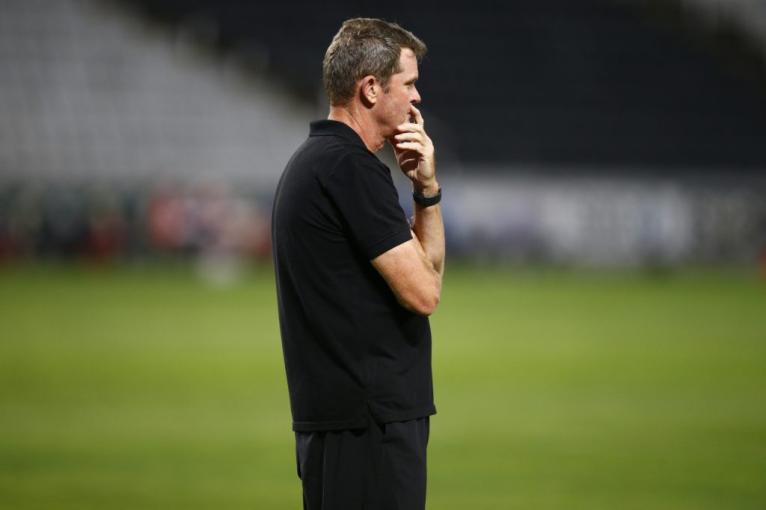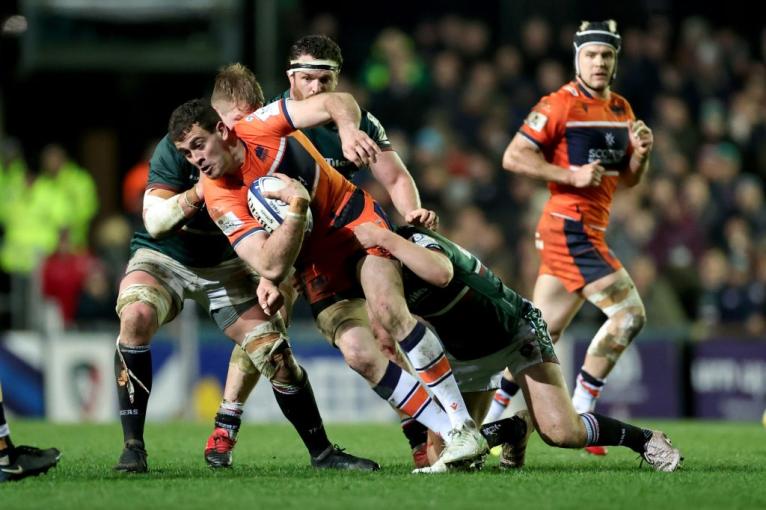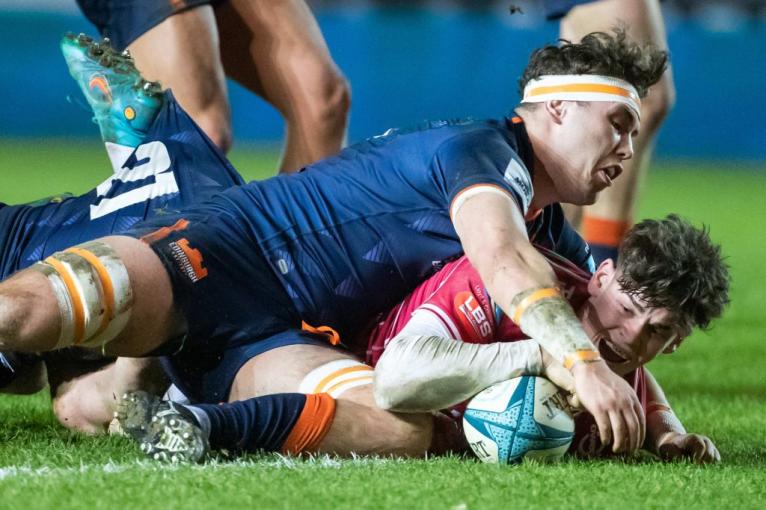One July afternoon at home on the outskirts of Durban, Sean Everitt took a call from the Scottish Rugby hierarchy. The next day, he underwent a formal interview for the role of Edinburgh head coach. Too modest to think much of his prospects, he was surprised when a contract offer whooshed into his inbox that evening. A day later, he signed the deal, and was on a plane to the Scottish capital within a week.
This upheaval was a violent departure from the norm for a man whose association with elite rugby in his home province had stretched beyond two decades. Everitt was a promising centre who played for the union’s B team in the 1990s while training to become a teacher. He hung up his boots and the very next day, was coaching youth rugby. Across 15 years he held pretty much every job in the Sharks set-up from coach educator to Under-21s lead to Currie Cup boss, right up to the very top gig in charge of the franchise’s flagship, Springbok-laden A-listers.
That came to a shuddering halt in March. Two years earlier, the Sharks had been bought over by an American consortium with deep pockets and, perhaps, shallower reserves of patience. They ploughed rand into the franchise, defying the flow of South African talent to Europe. Megastar Boks signed up, Siya Kolisi and Eben Etzebeth at the forefront. They had six world champions on their books last year.

For a time, as the Sharks’ form oscillated, Everitt felt the ground shifting beneath his feet. His days were numbered. And then his expensive squad, bereft of their top internationals, were walloped 35-0, at home, by Cardiff. The axe which had hovered above him came swooping down.
“Even though you might expect it, it does hurt,” he tells RugbyPass. “The first thing is, you doubt your ability and you doubt whether you’re good enough.
“You’ve got to look at the positives and the journey and ask, how did I get here at this level with the same franchise if I wasn’t good enough? I certainly think I was good enough. In my short stint at the Sharks, we were top of the table when Covid stopped Super Rugby. I’ve been involved in five Currie Cup finals and won two (in 2008 and 2013). We made the URC play-offs and qualified for the Champions Cup in 2022 – unfortunately we lost the URC quarter-final to an 82nd minute drop-goal against the Bulls otherwise it could have been completely different.
“I wasn’t unsuccessful at the Sharks. You’ve got to look at the positives and then you’ve got to move on quickly and get back to what you love. I love coaching and working with people.”
I’ve got to be bigger than myself and accept the Sharks, a franchise I love and respect, had to move in another direction.
You wonder if spending all those years in the same place leaves a person in a state of institutionalisation, a bit like old Brooks Hatlen, in The Shawshank Redemption who ran the library. Everitt had opportunities to move, but refused to leave or uproot his wife, Jacqui, and two sons.
“I was very blessed to have been in the same place for so long, being at home and watching my children growing up, not many coaches have had that opportunity.
“The people putting in the money have to have the final say. Clearly, I wasn’t part of the plans and I accept that. Post-Covid, all rugby unions around the world were struggling and the consortium gave us a lifeline. I’ve got to be bigger than myself and accept the Sharks, a franchise I love and respect, had to move in another direction. That’s how business works and they are in a good position from a financial point of view.”
Everitt spent the final few months of the season with the Bulls, consulting on their Currie Cup campaign. They wanted him to stick around, putting a two-year deal on the table. But when Everitt learned the Edinburgh job might be up for grabs, with his boys grown up and the Sharks behind him, he knew where he wanted to be.

Still, the details are intriguing. The terms are brief – an initial one-year contract. Is this a fleeting marriage of convenience or a long-term relationship?
“I think if you look at my record that would give you the answer. I would like to stay at the franchise.”
The nomenclature is different too; senior coach is Everitt’s official title rather than the customary head coach moniker. His predecessor, Mike Blair, was a talented rookie pulled in far too many directions by the all-consuming demands of the job. The hope is, Scottish Rugby have learned their lesson, and Everitt’s vast experience inside a rugby powerhouse allows him to spread himself more sparingly.
“I like being hands-on,” he says. “I have stepped back a bit because a lot of work was done prior to my arrival and I’ve got to make sure everyone stays aligned. But I have been hands-on with the changes I have made.”
I’d like to see Edinburgh developing their own players rather than bringing players in. I want to build a brand.
Edinburgh have a fine squad. A back-three the envy of most top clubs. A back-row with snarl and skill. Seasoned internationals coming out of their ears. There were statement wins in Europe last year – Saracens scalped at the Hive – but the last-16 defeat at Leicester Tigers was hugely disappointing.
In the URC, Edinburgh lost their way. Things unravelled apace. They scored 70 tries, but leaked 62. The average scoreline was 26-26. They kicked the least ball from hand in the competition and had a dire goalkicking rate of 61%. It was white-knuckle stuff, but it wasn’t winning rugby. They wheezed to a 12th place finish, tumbling out of Europe’s top tier.
Attacking rugby is in Everitt’s blood but his job now is to infuse the Edinburgh elan with a little pragmatism.
“When you are managing players coming in and out, you’ve got to make sure your systems are aligned to the national team. It’s very difficult to coach one system of defence then move to another, and then come back into the Edinburgh system. That’s where Edinburgh struggled. Scoring 70 tries and conceding 62 is not going to help. I like the fact they scored 70 and we’d like to emulate that, but we definitely need to work on our defence.
“It’s not necessarily the defensive system, it’s the reason why the system is coming under the pump. Every team concedes turnovers, it’s about how and where you are conceding them. Defences are hard to break down, and the way the laws are refereed has favoured defensive teams.
“To play multi-phase rugby in your own half is suicide because if you concede a turnover there, you’re definitely going to be in trouble, let alone if you concede a penalty. A large amount of tries are being conceded from lineouts, and the next-highest figure is tries from turnovers.
“The goalkicking percentage is a glaring fact a lot of people have missed. You talk about those close games, that invariably could be the answer to a problem you might be looking to solve elsewhere. You’ve got to kick at least 80%. Maybe if Edinburgh had kicked 80% the results would have been very different. That needs to be taken care of.”

Everitt’s wider vision for the club is heartening. A two-team professional setup means only 46 berths are up for grabs each weekend, and for the good of Scottish rugby, those cannot be dominated by imports. Sometimes, that means a coach must sacrifice immediate success for longer term gains and their bosses must make allowances accordingly. Edinburgh have a duty to blood local talent and refine it for international duty and Everitt has a rich pedigree in youth development. He brought through the majority of the Sharks emerging crop, many of whom have become regular Springboks.
“I’d like to see players coming through within Scotland. I’d like to see players coming through the club system here into the senior team. I’d like to see Edinburgh developing their own players rather than bringing players in.
“I want to build a brand which is bigger than just the URC team. It’s not only financially viable if you do it that way, but you get players who have social responsibility and are playing for reasons other than money. They are playing for their family and the people who have supported them throughout school. That’s how you create the want and need that you don’t often get from players from the outside. A lot of the URC players in the Sharks team are born and bred Durbanites. That’s what we wanted.
“We are spoiled for choice in South Africa and it’s not very often we would have U19 players training with the URC squad. Here, our U19 players are getting exposed to training with and against international players. That does speed up the pathway. It’s how you juggle it from week to week to give these guys an opportunity to play. We’ve had 16 players at the World Cup, internationals who rightly need to be rested, and that does give youngsters a chance, and for us to see whether they are good enough.”
With that in mind, Edinburgh’s pre-season began on 12th June. Earlier than usual, even in a World Cup year. More than four brutal, lung-burning months of preparation. Everitt has been there for three of them. It’s been treadmill of epic proportions.
Now, though, a bright light burns at the end of the tunnel. The URC begins this weekend; Everitt’s maiden assignment, a trip to Newport and the Dragons. Hemmed in tight by the city streets and terraced houses, Rodney Parade is a long way from the soaring stands of Kings Park; Newport in mid-October very different to Durban in a southern hemisphere spring. But it’s time to embrace the new – for Everitt and for Edinburgh.



Comments
Join free and tell us what you really think!
Sign up for free